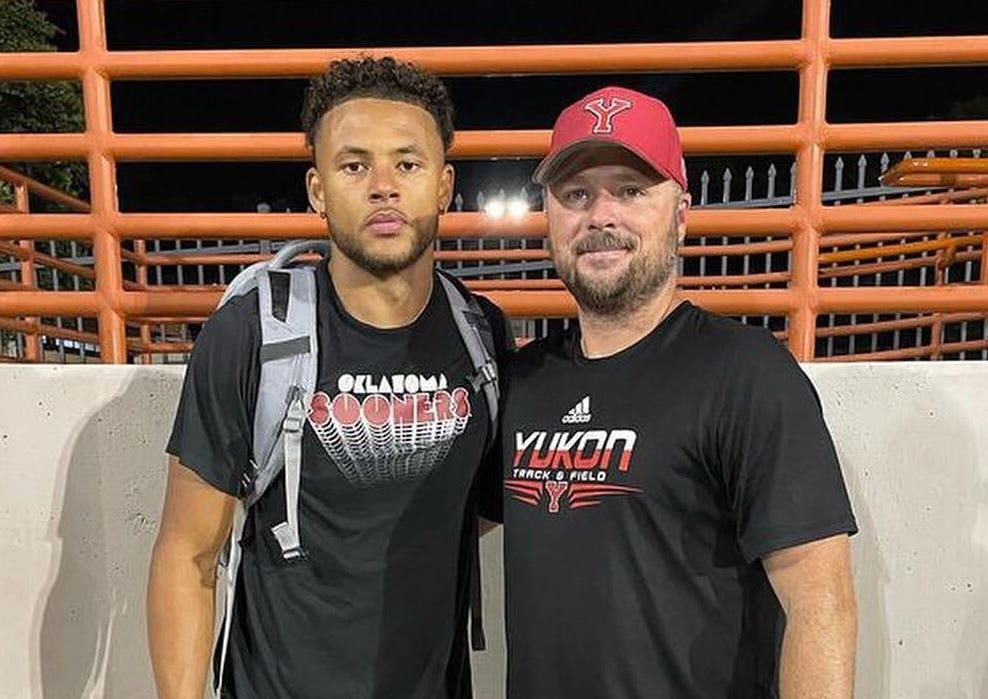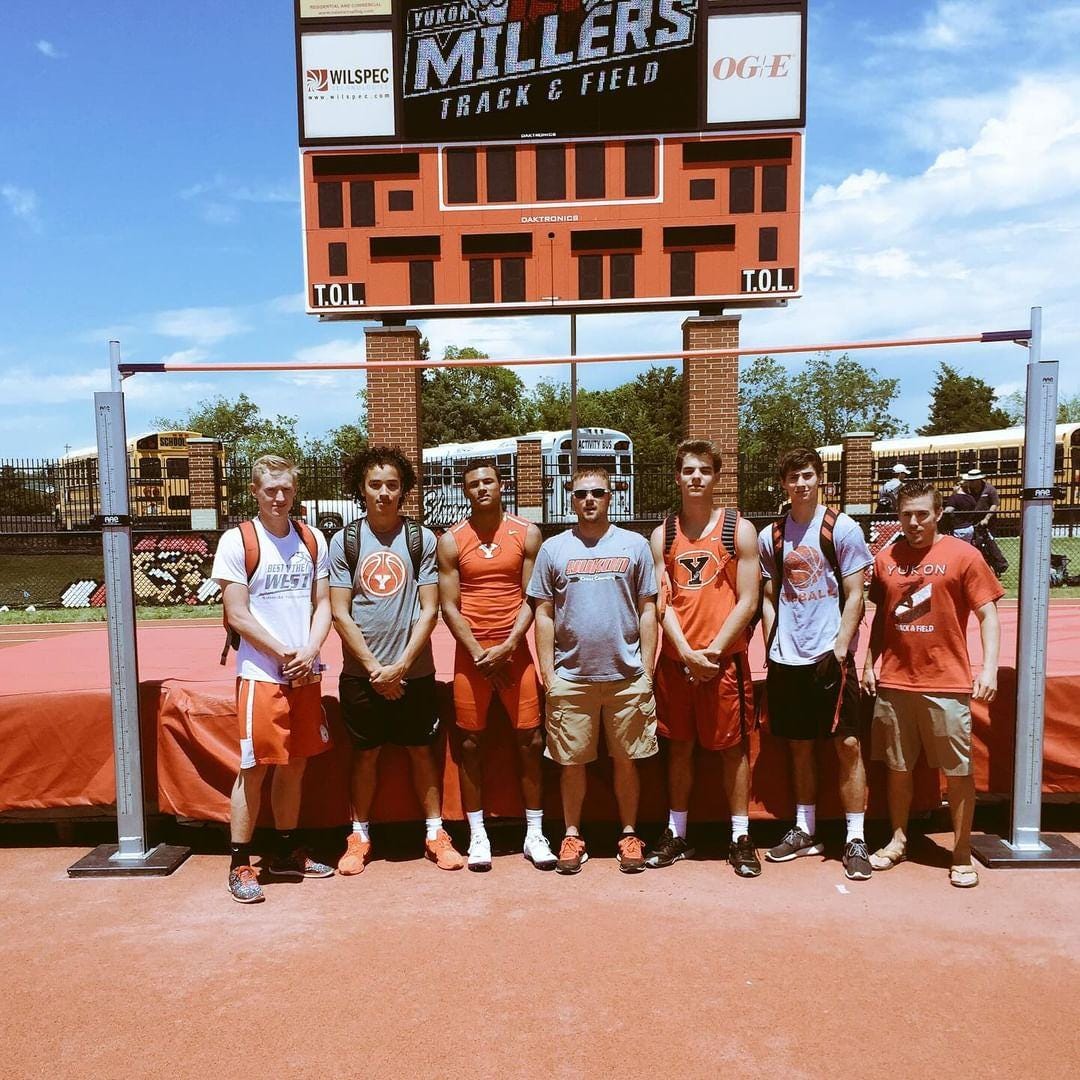RIGHT ANGLE: How a high school geometry teacher helped Vernon Turner high jump to the Olympics

If you want to know how Vernon Turner went from Yukon High School to Olympic high jump, you need to start with math.
Geometry, to be precise.
That was the subject taught by Kevin Ritter, the assistant track and field coach at Yukon who never competed in the sport but launched the career of a world-class high jumper.
"I don't know where I would be in life," Turner said, "if it wasn't for that dude."
He shook his head while sitting inside OU's indoor track a few weeks ago.
"I always tell him, 'Yeah, I had the ability, but you unlocked it.'"
What Ritter helped Turner unlock has opened so many doors, the biggest of which swings open this week. Turner is an Olympian. On Friday, he will ride through the heart of Paris on the River Seine with the rest of Team USA in the Opening Ceremony. Then on August 7, he will start his quest for Olympic glory in the high jump preliminaries.
He never dreamed that his journey would lead him to such heights.
Turner often thanks Ritter for his role.
"Oh, no," Turner remembers Ritter saying, "it wasn't me."
"But I could have had a random coach who was like, 'Oh, just run and jump,'" Turner has told Ritter. "I wouldn't be where I'm at. I would have never even known I had the potential to jump that high.
"That's why I say God put us on the same path."
‘This is just geometry’
Kevin Ritter went to Tulsa Union High School, and after playing basketball in college, finishing his career at Southwestern Oklahoma State, he returned to Union and spent 10 years as a basketball assistant at his alma mater.
"I had no thought of ever leaving Tulsa," Ritter said.
But as their kids got older, Ritter and wife, Danielle, wanted to be closer to her family in Merritt, just outside Elk City. The Oklahoma City metro area was a good middle ground, so in 2013, Ritter accepted a job at Yukon.
"We moved here," Ritter said, "and he's a freshman."
Vernon Turner was a freshman on Ritter's jayvee basketball team, and late in the season, Ritter encouraged Turner to do track that spring. He'd have more fun than in offseason basketball conditioning. He'd get to be outside. He'd get out of school to go to meets. And yes, there would be girls at the meets.
Turner eventually agreed, and Ritter figured Turner would become a runner.
But Turner and several of his basketball buddies decided to give the jumps a try. That's what Ritter was coaching for the first time, even though he'd never done track much less high jump.
Turner doesn't remember feeling like Ritter didn't know what he was talking about.
Quite the opposite.
"His math knowledge was crazy," Turner said. "I think that's honestly what it is. ... The way that he did the approach was specific to my body, my stride length. He broke it way down."
Ritter said, "The more I learned, the more I was like, 'This is just geometry. I'm a math teacher, so it's right up my nerdy alley.' ... It's all angles and math."
Ritter remembers watching athletes in other events and realizing when something was wrong, but he couldn't always pinpoint what needed to be fixed. With high jump, he could see the issue.
It made sense to him, particularly with the all-important run-up.
"Every step has a different radius, and it should get tighter and tighter as it goes," Ritter said. "You want to have a certain angle of attack at the bar. Different people need different angles. Sometimes, it's height. Sometimes it's how fast you are or how you're built.
"It's lines and running off circles and angles and trying to create the right angle with their body at takeoff."
Even with Ritter's understanding of high jump, Turner didn't exactly take off right away. He only cleared 5-2 in his first meet as a freshman, and no, he didn't win.
But late in Turner's sophomore year, Ritter started seeing glimpses of greatness.
A year later, Turner won regionals with a jump of 7-4.
"Congratulations," Ritter remembers one of the meet officials saying. "You're going to trials."
Ritter was sure he'd misunderstood.
"Say that again," Ritter said.
Turner's jump had qualified him for the 2016 US Olympic trials. He didn't make the team, but there aren't many 17-year-olds who even earn the chance to go to trials.
Ritter knew how unlikely the whole thing was.
"There's eight coaches," he said of Yukon's track coaching staff. "Seven of them did college track. One of them did not."
He chuckled.
"That was me. And I got the guy who everyone's coming to interview."

‘We’re the same person’
Vernon Turner just kept jumping higher.
As a senior, he broke the state record. Then he broke it again. And again. The fourth time he broke it, he also set a national high school record: 7 feet, 6 inches.
He kept upping his game.
Kevin Ritter did, too.
"The good thing about track is, if you ask high-level coaches questions, they answer," Ritter said. "I'm just messaging guys out of the blue who don't know who I am, don't know who he is. Other sports are like, 'No, these are my secrets. I can't share.'"
And as Ritter added more know-how, he found Turner to be a quick learner.
Ritter gave this example: usually if a coach asks a high jumper to adjust their starting position, the jumper's brain takes over and steers the body back to the same endpoint.
That wasn't the case with Turner.
"I can move him one foot right and one foot back," Ritter said, "and that endpoint would move a foot right and a foot back."
Ritter shook his head.
"His muscle memory was weird."
Because so much of Ritter's coaching led to better results, Turner had a high level of trust in him.
That was only magnified by their camaraderie.
"Whenever he got to Yukon, we instantly clicked because we're the same person," Turner said. "We talk crap and go after people. We're competitive."
Turner told me that a couple of weeks ago, the day after he got the official word that he'd made the Olympic team.
Earlier this week, Ritter said something almost exactly the same.
"We're the same person," Ritter said. "We have the same personality. ... So I think that helps sometimes because you can know what to say, when to say it."
Usually, they're joking with each other and giving each other grief, but lately, Ritter hasn't been shy about telling Turner how proud he is of him.
Turner hasn't hidden his gratitude either.
Turner recalls that he was one of four basketball players in his class at Yukon who also ended up high jumping for Ritter. One of them went on to play basketball in college. Turner and the other two went to college as high jumpers.
"I don't think any of us would have had the success that we had without Coach Ritter," Turner said, "and I don't think he realizes that. He doesn't want to take credit."
Even though Turner has had great coaching since high school, first as a collegiate athlete at OU, now as a pro who has trained this past year at LSU, he never would've started high jumping if not for Ritter. Wouldn't have stuck with it either.
"I never thought that I would be jumping over a stick," Turner said.
He's about to do so in the Olympics, thanks in part to a math teacher who changed his equation.




